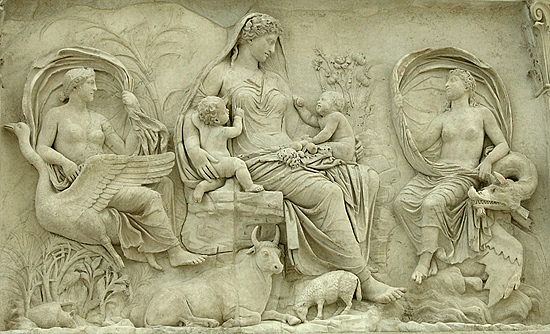 |
This is the last of the so-called Roman Odes (Carmina 3.1-6), poems in which Horace supports the virtues of Augustus' program of moral and religious reform. It is caustic in its description of Rome’s current mores and dark in tone; it warns that the Romans will pay for their fathers' sins until the gods' temples have been repaired and traditional Roman pietas restored. He illustrates the decline of the state’s prestige and power by comparing the manners of his own time with the mores maiorum, the rusticorum mascula militum proles (manly offspring of farmer-soldiers) and the severae matres (stern mothers). The four stanzas below (5-8) focus on the infidelity of married women and the complicity of husbands and lovers. In them Horace indicts behaviors that the Roman love poets, including himself, playfully celebrate in their fictions. The meter is Alcaic; see first stanza scanned.
| Fecunda culpae saecula nuptias | |
| primum inquinavere et genus et domos: | |
| 20 |
in patriam populumque fluxit. |
| Motus doceri gaudet Ionicos | |
| matura virgo et fingitur artibus, | |
|
iam nunc et incestos amores |
|
| 25 | Mox iuniores quaerit adulteros |
| inter mariti vina, neque eligit | |
| sed iussa coram non sine conscio | |
| 30 | surgit marito, seu vocat institor |
Click on the underlined words for translation aids and commentary, which will appear in a small window. Close this small window after each use.